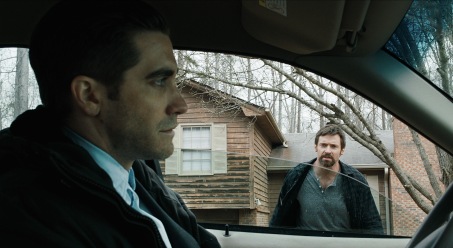By: Max Conoley, Editor

Pray for the best, prepare for the worst. This is the philosophy by which Keller Dover (Hugh Jackman), a carpenter living in Pennsylvania, lives by. He tells his teenaged son that the most important lesson his father taught him was to be ready for anything, but nothing could have prepared him for what is about to happen.
Dover and his wife Grace (Maria Bello) are happily married with a teenaged son and a young daughter. The film opens with them going to eat Thanksgiving dinner at the home of their neighbors, Franklin and Nancy Birch (Terrence Howard and Viola Davis) and their two children of the same age as the Dover’s kids. What starts out as a happy feast between the two families transforms into every parent’s worst nightmare when the two young daughters ask if they can go to the Dovers’ quickly. The children are allowed to leave, but they never return.
Alex Jones (Paul Dano), who was driving an RV through the neighborhood around the same time the girls disappeared, is quickly apprehended and labeled the prime suspect. The problem is, Jones has the IQ of a ten-year-old, meaning there is no way he could successfully kidnap the girls and not leave a shred of evidence. So, he is released into the custody of his aunt (Melissa Leo) with orders to not leave the state. It doesn’t come as a surprise that the parents, Keller in particular, are less than thrilled about this.
Hugh Jackman has delivered some good performances in the past, most notably as the superhero Wolverine, but this is by far the best performance of his career. As the film progresses, Keller slowly becomes the kind of demon that a religious man like him would condemn. Although he is a man that the audience should feel remorse for, his actions throughout the film make you consider losing faith in him, but they also make you think long and hard about what you would do if you were in the same situation as him.
At the opposite end of the spectrum is Detective Loki (Jake Gyllenhaal), the lead detective on the case with a perfect arrest record and a determined look in his eyes. Unlike Keller, Loki doesn’t have a personal life to speak of. Instead of celebrating Thanksgiving with family and friends, we see him eating his dinner in a diner and having a conversation with his waitress over the signs of the Chinese Zodiac on his placemat.
Throughout the film, Keller and Loki butt heads every time they share the screen. Keller is determined to find his daughter by any means necessary. Loki is just as determined, but police scrutiny and his sound methods are leading the case in a direction that Keller doesn’t agree with and there is nothing Loki can say or do that will convince him otherwise.
The performances in the film are all top notch. Jackman and Gyllenhaal both deliver the best performances of their careers, each worthy of award consideration. Bello, Howard, and Davis don’t have as much screen time as you would expect considering they’re the parents just as much as Keller is. Dano, who I never really have liked as an actor, gives a great performance, his character’s clothing and just the general look on his face make him seem like a total creep. Leo also shines in a small, but pivotal role, and Wayne Duvall also does some fine work as the chief of police that is making Loki follow the evidence instead of his gut. The real stars here, however, are the people behind the camera. Canadian director Denis Villeneuve (Incendies) had not made an English language film prior to this, but his previous films have displayed his talents from behind the camera and they show again here. Screenwriter Aaron Guzikowski (Contraband) took a generic plot idea and turned it on its side with a script that keeps the audience guessing while incorporating some powerful religious-based overtones to the story. Icelandic composer Jóhann Jóhannsson’s score is electrifying. And the cinematography is some of the best from the great Roger Deakins, who has ten Academy Award nominations dating back to 1991, it’s that good.
As good a film as it is, Prisoners is not for everyone. Some of most pivotal scenes involve torture that might make you feel uneasy later on. The two-and-a-half hour running time and the slow pacing make the film drag on at certain points. With a little sharper editing, I think this film would have come out just as good, if not better, with a running time of about 20 minutes shorter, but the problem is that I can’t think of any scene that would have been better of if left on the cutting room floor. That is my only issue with this movie, though. You will not forget Prisoners after you see it.
FILM GRADE: A-